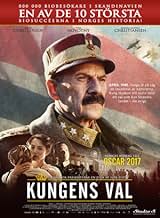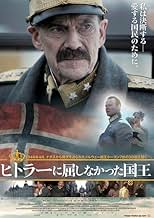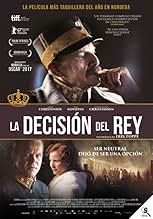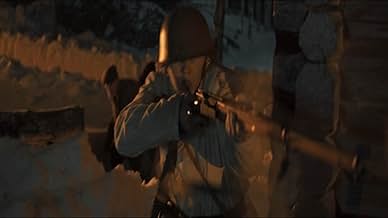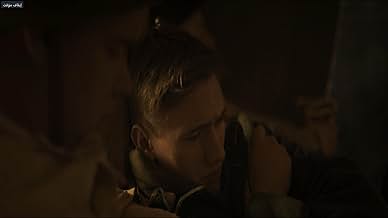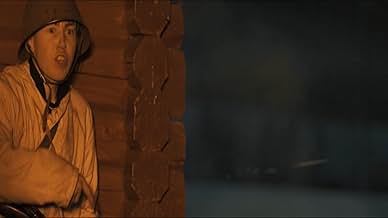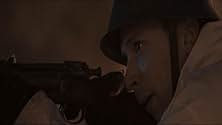April 1940. Norway has been invaded by Germany and the royal family and government have fled into the interior. The German envoy to Norway tries to negotiate a peace. Ultimately, the decisio... Read allApril 1940. Norway has been invaded by Germany and the royal family and government have fled into the interior. The German envoy to Norway tries to negotiate a peace. Ultimately, the decision on Norway's future will rest with the king.April 1940. Norway has been invaded by Germany and the royal family and government have fled into the interior. The German envoy to Norway tries to negotiate a peace. Ultimately, the decision on Norway's future will rest with the king.
- Director
- Writers
- Stars
- Awards
- 15 wins & 9 nominations total
- H.K.H. Kronprins Olav
- (as Anders Baasmo Christiansen)
- Director
- Writers
- All cast & crew
- Production, box office & more at IMDbPro
Featured reviews
The Germans want to negotiate after occupying main Norwegian cities. They turn directly to the king, trying to make it his decision to avoid more bloodshed. That's his decision. And there is an answer.
Jesper Christensen is tremendous as king Haakon, making the moral dilemma more complicated than it's described in the script. Much is really filmed theatre here, but you tend to forget it, when Christensen is on the screen. Which he is very much.
This film was sent to the 2017 Oscars, unfortunately it did not advance to the main event. They might have expected recognition similar to the British film. But I think both the films were good in their own way with the kind of story they told us that took place in the backdrop of the most terrible time of the recent human history. So having a similar title name justifies. It is a biopic, but the story was covered from different angles to reveal us what happened on the other side, including one of the young soldiers who fought in that war.
The story begins with the April 1940, while the Nazi army sailing towards Norway and after losing most of the cities to them, the people fled to safer places. That did not spare the Norwegian cabinet members, as well as the king Haakon VII and his family. In those hard times, he kept the nation united by respecting to how the government decided to deal with the situation.
But on one occasion, through a German diplomat with a one-time offer directly from Adolf Hitler leave the king to make the crucial decision for his nation and its people. That's the part of the film to define its title. So everything leads to that moment, how he reacts and what follows decides the Norway's fate to stand on what side of the ongoing war.
❝If I am the last card in the deck, so be it.❞
It's a well made film. Neither too violent nor avoided the war depictions to turn it more drama type. Everything had its share, including those war atmosphere for such budget was impressive. More like it was a running and chasing theme. But in the initial parts, there were too many timelines mentioned about what happened on when. Details like that are really good, though I felt it was too much to take on, especially for a foreign film.
Once the tale enters the mid section, looked all were in order and also got very interesting than before. In a cold country like Norway, in those situations you are like in a multifold trouble. I mean from the common man's perspective. An army is chasing you and harsh winter, surviving that is very challenging.
All the actors were great, but the king steals the show. If this was an American film that had taken place in America, then he would have won the Oscars. The fresh undertaking films on the World War II themes would never go fade away. So this is one of the best in that kind in the recent time. Except the opening, I did not have any trouble following it. Even the 130 minutes looked shortened. But I won't think everybody would feel the same way as I did. Like any WWII films, it is a must see, particularly to learn from the Norway's perspective of the war.
But this was depicted from the early stage of the war. And since it was majorly focused from the king's perspective, being a first king elected by his people, how he had faced it, following his crucial decision leads the way to the film's conclusion. If you are as war film fan, particularly the WWII, the actual best part begins henceforth which I'm hoping for a sequel to focus on. If you are not anticipating like the top WWII films you have seen, it can be picked for a watch. But anyway, I would recommend it.
7/10
In April 1940, a fleet of German ships slips through Norwegian defences and issues an ultimatum: surrender or perish. Denmark had only recently capitulated to Germany but Norway's King Haakon VII (Jesper Christiansen) had no intention of following its example. Norway's traditional neutrality and antiquated military capacity made it seem defenceless, but it still managed to sink one warship which infuriated Hitler. A German envoy urged the King to accept a peaceful surrender and save Norwegian lives, but he refused to make it easy for the Nazis to take Norway. The Norwegian parliament was in disarray, nominally led by a Nazi-sympathiser with the surname Quisling, a word that universally has come to mean traitor. The nation was terrified and only the royal family was left as a symbol of hope and inspiration. Hitler was desperate to capture the family alive as a trophy for Nazi supremacy. The revered King and his heir apparent son fled to the countryside with Nazis in pursuit. Along the way, the envoy, his few remaining parliamentarians, and even his son, repeatedly urge the king to surrender. While Norway's collapse was inevitable, the royal family escaped to London where they led the Norwegian resistance for the remainder of the war.
There are several reasons why this film deserves praise. The most obvious is that it illuminates a piece of history that most people, except Norwegians, know very little about. It is a measured, sombre study of leadership with a competent cast, excellent cinematography, and detailed period sets and costumes. It provides a finely wrought portrait of a nation facing catastrophe using minimal dramatic embellishment yet with tension that rises over its long running time (two and a quarter hours). Jesper Christiansen plays King Haakon with regal authenticity as he goes from being a grandfather figure playing with children to a giant of integrity in the face of an extraordinary moral dilemma. The king's choice was his and his alone, and the film captures the enormous strain of knowing that Norway had no prospect of resisting the Nazi juggernaut yet believing that a nation's dignity should never be surrendered.
Despite its epic qualities there are some minor quibbles. Foreign language translations inevitably struggle with nuance and keeping up with dialogue is made more difficult when white sub-titles appear against white backgrounds, The film's pace would have benefited from more editing, less CGI and fewer scenes of the royal family in flight. But otherwise this is a gripping character-driven film that provides a fascinating glimpse into Norway's war history.
More reviews https://cinemusefilms.com
The story of The King's Choice takes place in Norway during the Second World War and follows the Norwegian King who's forced to make a difficult choice after his nation is invaded by Nazi Germany despite his country's neutral position in the war and has to decide whether to continue fighting the Germans or surrender, a decision that will shape Norway's future.
Directed by Eric Poppe, the film opens with a montage that provides a brief overview of Norway's elected monarch and his role in governing the nation, following which it jumps to 1940 and moves ahead from there. Poppe's direction is brilliant for the most part, as he is able to keep the interest alive and delivers some thrilling moments of chaos & destruction that war brings with itself.
There are only a couple or more battle sequences but all of it is thoroughly riveting & expertly shot. The drama is compelling, the tension is palpable, and its characters are interesting to some extent but there are still a few moments when it indulges in trivial matters which take the focus away from what's relevant. Its 133 minutes narrative is steadily paced but it begins to lose steam after a while.
My favourite aspect, however, is the background score, for it is able to elevate & enrich the impact of many segments with its ingeniously composed & emotionally evocative tracks that are always in sync with the unfolding events. Camera-work is equally well-balanced, and the cast delivers strong performances throughout by playing their given roles with aptness & leave nothing to complain about.
On an overall scale, The King's Choice has its shares of positives & negatives but it manages to be a gripping experience for the most part. It doesn't hold back anything when it comes to capturing the visceral nature of war and is fabulously supported by a rousing score in those moments but it also lacks the same level of intensity in the dramatic portions at times and fails to hit as hard as it was capable of. Still, definitely worth a shot.
Did you know
- TriviaWilhelm Scream: When Seeberg shoots the German soldier at Midtskogen.
- GoofsThe real Battle of Drøbak Sound was much more involved than depicted, the other coastal defense batteries also joining in after the Oscarsborg Fortress had opened fire.
- Quotes
Menig Fredrik Seeberg: All for the King, Your Majesty.
H.M. Kong Haakon VII: No, Seeberg. All for Norway.
- How long is The King's Choice?Powered by Alexa
Details
- Release date
- Countries of origin
- Official sites
- Languages
- Also known as
- The King's Choice
- Filming locations
- Production companies
- See more company credits at IMDbPro
Box office
- Gross US & Canada
- $113,231
- Opening weekend US & Canada
- $7,850
- Sep 24, 2017
- Gross worldwide
- $10,017,316
- Runtime
- 2h 13m(133 min)
- Aspect ratio
- 2.35 : 1



